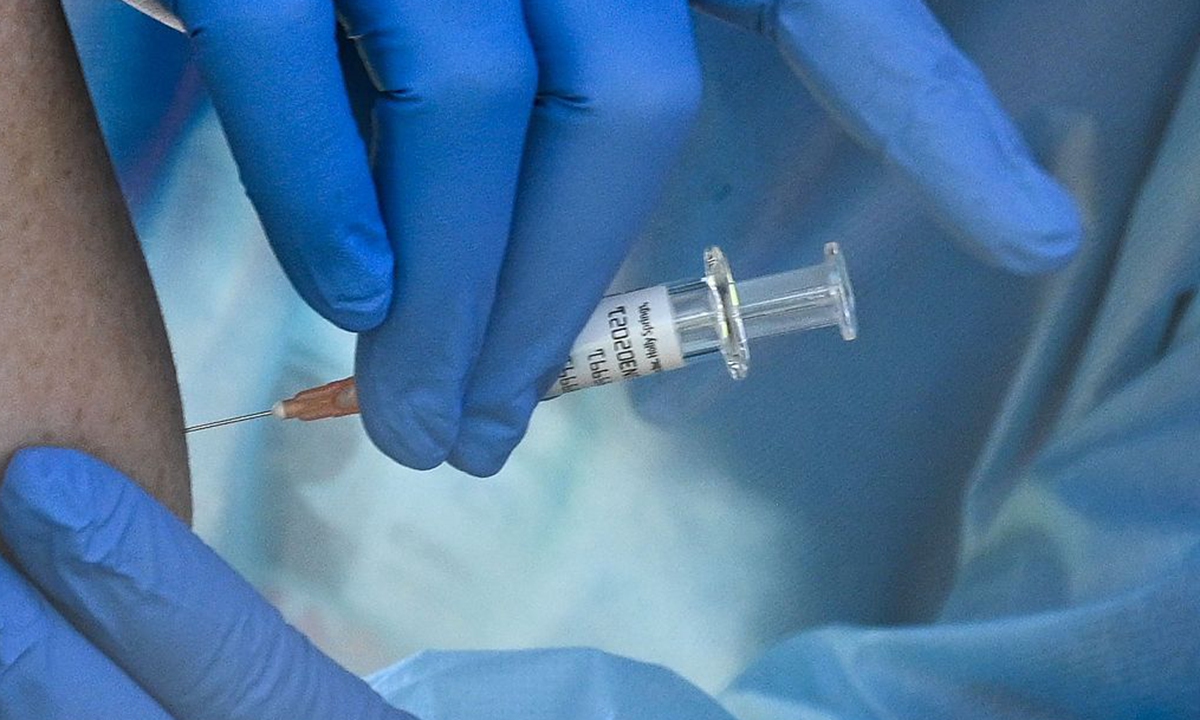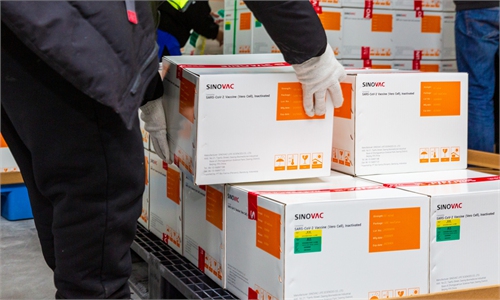
vaccine Photo:VCG
The countdown has begun for global coronavirus vaccinations to be rolled out. But the life-saving product has been, time and again, politicized by certain Western media, which portray China's vaccines as a bargaining chip to change the geopolitical landscape."Vaccine diplomacy" is one of their most frequently used terms, as a December 10 AFP article put it, "China's 'vaccine diplomacy': A global charm offensive."
It stated that vaccines have become "a tool to increase China's global influence and iron out... geopolitical issues." It added that "Beijing may use its vaccine donations to advance its regional agenda," such as its claims in the South China Sea.
After the first batch of 1.2 million doses COVID-19 vaccine from China landed in Indonesia on December 6, the Financial Times argued that, "there are political strings attached." When reporting the vaccine deal between China and the Philippines on Monday, CNN noted that it is an offer meant to improve China's global reputation.
These analyses are filled with condescending tones. Most of the Western media deliberately smears that every move made by China has a calculated political ruse.
Because of such mind-set, when The New York Times voiced strong objection to Western countries' attempt to seek monopoly control of COVID-19 vaccines and appealed for suspension of related intellectual property rights, it did not mention a single word about China's promise to make coronvairus vaccine a global public good. How hypocritical.
Compared with China's generosity, the US has made no secret of its selfishness. The White House has made clear it seeks to prioritize Americans for coronavirus vaccine shipments, and then it would take care of its main allies. This is actual evidence of the politicization of vaccines - making one join the US camp to get life-saving jabs.
Yet there has been little discussion about it among US media outlets. They instead are busy opening fire on China as the country offers to share its vaccines with other developing nations. By contrast, the West can hardly promise them anything regarding vaccines.
Being the first country that has effectively undertaken virus control measures, China takes the lead in COVID-19 vaccine research and development. More importantly, China has released its good faith to cooperate with other countries, regardless of their ideologies; whether they are US allies or have disputes with China.
Beijing's announcement to make its coronavirus vaccines a global public good means China is determined to rely on its strong industrial production capacity to ensure its vaccines are affordable for every developing country. It will not seek raw profits through enforcing patents at a time of crisis, unlike Western countries.
Philippine President Rodrigo Duterte made his point clear as early as September: China, unlike other countries, does not seek a "reservation fee" or advance payment for vaccines. But Western countries, "want cash advance before they deliver the vaccine. If that's the case, then all of us will die," said Duterte.
Most developing countries are now living under financial strains. They can hardly count on the US and Europe on vaccines. So what's wrong with them to cooperate with China? Or would Western media rather see them hung out to dry?
"Vaccine diplomacy" is a trite headline conceived of by the West's own mentality. They are simply talking to and persuading themselves. They treat China's vaccines just as they treat China's rise, with complete contempt and jealousy. A fundamental reason is that the US and European countries have failed miserably to combat the virus. Vaccines have become their last hope, a straw to clutch at. They cannot afford to fail in the vaccine race. Taking advantage of their power to manipulate public opinions in an attempt to smear China's vaccines has thus turned out to be a convenient choice.
Will other countries take the US side in terms of vaccines? If so, they may gain nothing but verbal praises and more deaths. Or will they cooperate with China and save lives? It is unclear how many countries will gamble on their people's wellbeing. Yet it is certain more and more nations will have second thoughts.
The Philippines, an ally of the US, has undoubtedly seen the truth. The US is lost in its epidemic efforts, and there aren't enough vaccines to go around in the super power itself. It is an illusion to wish Washington will provide a large number of shots for Manila any time soon. Even in Europe, Hungary, an EU member, is seeking emergency domestic approval for the Chinese coronavirus vaccine rather than wait as normal for a review by the EU's European Medicines Agency, according to reports.
A most vital lesson for the year 2020 is that the novel coronavirus knows no borders or political systems. Any country that keeps sticking to the wrong path of politicizing the pandemic will only continue to struggle in the public health crisis.
The author is a reporter with the Global Times. opinion@globaltimes.com.cn


